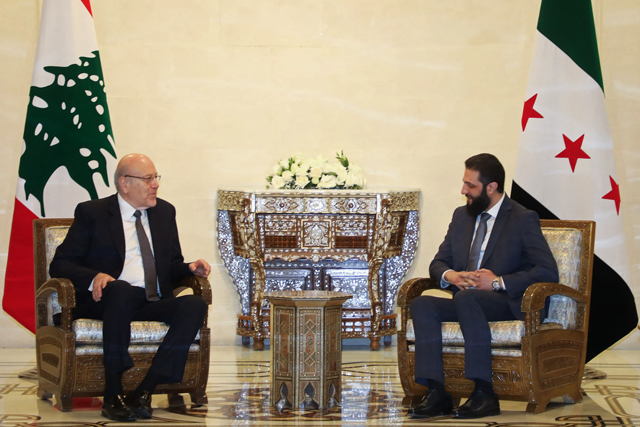Damascus — Syria's new ruler and Lebanon's prime minister pledged on Saturday to build lasting ties during the first visit by a Lebanese head of government to Damascus since the start of the civil war in 2011.
Prime Minister Najib Mikati's trip came after Islamist-led rebels seized Damascus last month, bringing an end to the rule of Bashar al-Assad.
Previous Lebanese governments refrained from visits to Syria amid tensions at home over the militant group Hezbollah's support for Assad during the conflict.
Syria's new leader Ahmed al-Sharaa said he hoped to turn over a new leaf in relations, days after crisis-hit Lebanon finally elected a president this week following two years of deadlock.
"There will be long-term strategic relations between us and Lebanon. We and Lebanon have great shared interests," said Sharaa.
It was time to "give the Syrian and Lebanese people a chance to build a positive relationship", he said, adding that he hoped Joseph Aoun's presidency would usher in an era of stability in Lebanon.
Sharaa said the new Syria would "stay at equal distance from all" in Lebanon, and "try to solve problems through negotiations and dialogue".
Mikati said new ties should be based on "mutual respect, equality and national sovereignty".
Syrian refugees
Syria was the dominant power in Lebanon for three decades under the Assad family, with president Hafez al-Assad intervening in its 1975-1990 civil war and his son Bashar al-Assad only withdrawing Syria's troops in 2005 following mass protests triggered by the assassination of Lebanese ex-prime minister Rafic Hariri.
After mending ties with Damascus, his son Saad Hariri was the last Lebanese premier to visit the Syrian capital in 2010 before the civil war.
Taking office on Thursday, Aoun swore he would seize the "historic opportunity to start serious... dialogue with the Syrian state".
With Hezbollah weakened after two months of full-scale war with Israel late last year and Assad now gone, Syrian and Lebanese leaders seem eager to work to solve long-pending issues.
Among them is the presence of some two million Syrian refugees that Lebanon says have sought shelter on its territory since the Syrian war started.
Their return to Syria had become "an urgent matter in the interest of both countries", Mikati said.
Lebanese authorities have for years complained that hosting so many Syrians has become a burden for the tiny Mediterranean country which has been wracked by the worst economic crisis in its history since 2019.
Mikati also said it was a priority "to draw up the land and sea borders between Lebanon and Syria", calling for a joint committee to be set up to discuss the matter.
Under Assad, Syria repeatedly refused to delimit its borders with its neighbour.
Lebanon has been hoping to draw the maritime border so that it can begin offshore gas extraction after reaching a similar agreement with Israel in 2022.
'Smuggling'
The Lebanese premier said both sides had stressed the need for "complete control of [land] borders, especially over illicit border points, to stem smuggling".
Syria shares a 330-kilometre border with no official demarcation at several points, making it porous and prone to smuggling.
Syria imposed new restrictions on the entry of Lebanese citizens last week, following what the Lebanese army said was a border skirmish with unnamed armed Syrians.
Lebanese nationals had previously been allowed into Syria without a visa, using just their passport or ID card.
A string of foreign dignitaries have headed to Damascus in recent weeks to meet the new leaders, with a delegation from Oman also in town earlier on Saturday.
Unlike other Arab Gulf states, Oman never severed diplomatic ties with Assad during the war.
Italy's Foreign Minister Antonio Tajani visited Damascus on Friday, while France's Jean-Noel Barrot and his German counterpart Annalena Baerbock did last week.
Shaibani has visited Saudi Arabia, the United Arab Emirates, Qatar and Jordan since the start of the month, and said Friday he would head to Europe soon.
Syria's war has killed more than half a million people and ravaged the country's economy since starting in 2011 with the brutal crackdown of anti-Assad protests.
